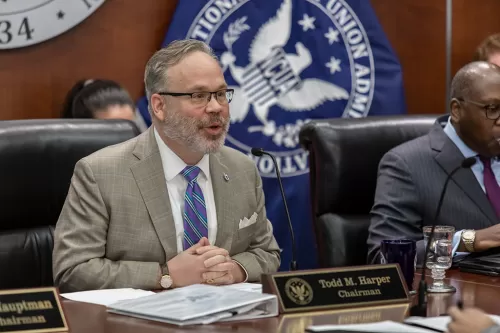NCUA Chairman Todd M. Harper during a meeting of the NCUA Board.
As Prepared for Delivery on May 25, 2023
Thank you, Eugene, for the update on the performance of the National Credit Union Share Insurance Fund in the first quarter of 2023.
First, I want to congratulate everyone across the NCUA for their contributions to our award-winning 2022 Annual Report to Congress, especially those who work in the Office of the Chief Financial Officer, the Office of External Affairs and Communications, and the Office of the Chief Economist. As Eugene noted, the NCUA’s annual report received the Certificate of Excellence in Accountability Reporting (CEAR Award) from the Association of Government Accountants — the agency’s sixth such award.
This track record of excellence underscores the NCUA’s successful performance, sound financial management, and commitment to transparency. It also demonstrates the NCUA’s commitment to achieving our mission, safeguarding the resources entrusted to us, and maintaining the highest levels of accountability. Thank you, all, for a job well done.
Now, let’s turn to the subject at hand. The Share Insurance Fund generally continued to perform well in the first quarter of the year. Investment income continued to increase with the rise in interest rates and the shift in the fund’s portfolio to overnight investments, which yielded more than longer-term securities. But I was somewhat surprised in looking at the data on slide 2. While total income is nearly 50 percent higher than in the first quarter of 2022, net income is down by $12.5 million compared to a year ago. Why is that, Eugene?
Thank you. I appreciate those insights. In looking at slide 3, I also see that the line for accounts payable and other liabilities is up considerably. Compared to last year, this item is more than 10 times larger. Why is that? And should we be concerned?
Thanks for those observations. On slide 8, I see that the equity ratio for the Share Insurance Fund is projected to decline to 1.25 percent at the end of the second quarter. This decline in the equity ratio is typical as the industry does see elevated insured share growth in the first half of the year. But, if insured shares grow by less than anticipated, we might actually have a higher equity ratio. Why is that, Eugene?
Thank you. While the projected equity ratio is above the statutory minimum for the fund, it is still below the Board-approved normal operating level. Additionally, the levels of insured shares and assets in CAMELS code 3 credit unions continue to increase, though the number and assets of CAMELS codes 4 and 5 credit unions remain stable, as found on slide 9. This could, however, just be the calm before the storm.
Eugene, I know that we are starting to see downgrades in the liquidity, market sensitivity, and management components of the CAMELS rating. Nationwide, total household debt is also rising, according to the latest Quarterly Report on Household Debt and Credit released by the Federal Reserve Bank of New York. And, within the credit union system we’re seeing increases in home equity lines of credit, higher used auto balances, and higher than expected credit card balances in the first quarter.
Together, these data points suggest the budgets of credit union members are being stressed as consumers continue to manage higher interest rates and inflation. If we continue to see falling CAMELS component scores at credit unions and further increases in consumer borrowing and delinquencies, what might that generally mean for the chart on slide 9 in future quarters and for the Share Insurance Fund’s reserve needs?
Thank you, Eugene. Credit unions should prepare for an increase in delinquencies and charge-offs in the months ahead. Credit unions should also work with these households to help them navigate through these challenging economic times.
Additionally, the NCUA will continue to monitor credit union performance through the examination process, offsite monitoring, and tailored supervision of credit unions experiencing problems. And the NCUA Board will continue to closely watch credit union and Share Insurance Fund performance so that we may take any necessary actions to maintain the system’s stability and ensure the Share Insurance Fund’s strength.
Despite all these looming challenges, the credit union system currently remains well-capitalized, stable, and well-positioned to handle a broad range of economic possibilities. Consumers, therefore, should remain confident that their insured share deposits at federally insured credit unions are safe. I know that the Board also stands united in our resolve to ensure that no one ever loses a penny of insured share deposits at a federally insured credit union.
That concludes my remarks. I now recognize Vice Chairman Hauptman.



